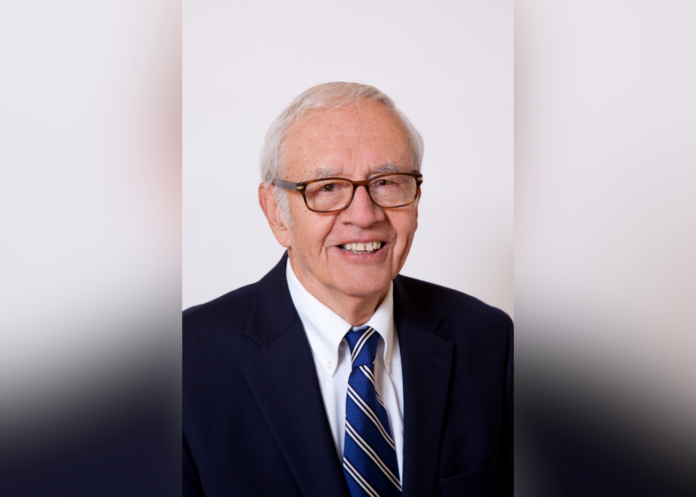
On June 26, retired local attorney Jerry Caplan died at the age of 92. Caplan was the co-founder of Caplan & Earnest and a prominent education law attorney in Colorado. He founded the firm alongside Lane Earnest, who worked for Caplan as a law student.
The firm, based in Boulder, Colorado, currently has around 30 attorneys practicing in education law, health law, estate planning, family law, immigration law and business law, among others.
Caplan could be considered a founding father of education law as it currently exists as a legal practice area in Colorado. At the dawn of new regulations, laws and legal requirements for schools and school districts stood Caplan and a handful of attorneys at Caplan & Earnest.
Stu Stuller, special counsel at the firm, said Caplan knew what education and schools meant to the community on a deeper level. “Jerry had a strong sense of what the education system meant within the community,” he said. “School districts are political subdivisions, they’re subject to a whole host of laws and both statutory and constitutional that you don’t get when you’re just working for private entities.”
According to Richard Bump, a member at Caplan & Earnest, Caplan’s reputation in this area spread and he quickly gained school district and education-related clients. “Because of his work back then, I think we could say that he helped establish education law as a distinct practice area in Colorado.”
As his reputation grew, Caplan received several prestigious awards for his legal services. He was the second recipient of the National School Boards Association Council of School Attorneys’s Lifetime Achievement Award. He was also a fellow of the American College of Trial Lawyers, a selective honor and significant achievement within the legal community.

Caplan served as chair of the Board of Trustees of the University of Northern Colorado and as adjunct faculty member of the University of Colorado’s School of Journalism, teaching First Amendment Law. He was president of the Boulder County Bar Association, Boulder County Public Trustee, Boulder municipal judge and special assistant attorney general of Colorado. Caplan was also the founding president of the Colorado Council of School Attorneys, president of the National School Boards Association Council of School Attorneys and a fellow of the American Bar Foundation.
“I started out as most young attorneys do, really doing anything that came in the door,” Caplan told Marvin Woolf in a 2007 interview with the Carnegie Library for Local History, Boulder.
He originally earned his bachelor’s and J.D. degrees from Syracuse University, then served in the Judge Advocate General’s Corps of the Army before starting his law practice in Boulder.
Caplan said his career took a turning point in the 1960s when the Boulder Valley School District was on the hunt for a new attorney after its former attorney Forrest Cook joined a new law firm.
“Betsy and I were in Aspen skiing, and I got a phone call that I had been selected,” Caplan recalled in the 2007 interview. “So I decided because of that momentous event that I would treat — I think there were three other couples — to dinner which I did.” He said he remembered that to treat four couples to dinner in Aspen back then was less than $100.
After BVSD selected him, Caplan said he made education law a cornerstone of his practice. “It was a critical move, and for a young lawyer to have a cornerstone client of that magnitude, of that importance, was significant,” Caplan told Woolf. “And I loved the work. I’ve always been interested in education. I like the mission of the schools. As a lawyer, I associated myself happily with that mission and was proud to do it, and it blossomed. It grew into a career for me.”
Stuller recalled Caplan helped develop the field of education law in the state of Colorado. “He received a lifetime achievement award from the [National School Boards Association] because of the development of that practice,” Stuller said.
While Caplan seemed to be at the forefront of the development of education law as a legal practice area in Colorado, Stuller said he wasn’t alone. Caplan & Earnest had built out its education law section quickly.
“By the time I joined, [they] had probably 10 or 12 attorneys who were devoting most of their days to working with school district issues. We met once a week,” Stuller said.
“At one point I represented about 60 districts all over the state of Colorado,” Caplan said in 2007. Caplan noted the school districts mostly needed attorneys to help with the purchase and sale of property.
But this wasn’t the only brush with properties and school districts that was of import to local attorneys and the courts.
One of the biggest cases Caplan worked on was Lujan v. Colorado State Board of Education. Alex Halpern, who is currently a solo practitioner, also worked on the case with Caplan when he was with the firm in the early 1980s.
The Lujan case tackled whether Colorado’s way of determining the financing of public elementary and secondary education institutions was unconstitutional. The trial court found it was, but an appeal led to the Colorado Supreme Court overturning that ruling.
Back then, the school finance system got roughly 47% of its operating income from local property tax levies.
“The basis of the argument was property tax values by district drive educational opportunity, which, by the way, I have to tell you, after 50 years, I think is still correct,” Halpern recalled “But the plaintiffs had a difficult problem, which was they were unable to provide a method of substantiating the difference in educational opportunity from one district to another, and part of our position was the difference in cost or expenditure levels by district were driven by other things than property wealth.”
Halpern said the state Supreme Court ruling was a defeat for low-property-wealth school districts. “It did, however, drive some significant legislative response — significant but probably insufficient legislative response — to try to fix that situation … to take property tax base values out of or as much as possible neutralize them as a factor in school finance,” said Halpern.
“They revised the school finance formulas,” Halpern explained. But he said lawmakers didn’t touch the funding mechanism for certain areas for schools. “For example, capital improvements, building schools and things like that, were exclusively funded by property tax back then, and they didn’t adjust that, which [may be] a continuing problem for lower property value district[s].”
Halpern said Caplan was a mentor figure for him, both on the Lujan case and generally, at a time when professional mentorship wasn’t very common.
Bill Kowalski, who sometimes worked with Caplan on school district matters that went to litigation, said he served as a mentor for him too. “He was just so calm and confident,” Kowalski explained. “Confidence is something you get in litigators. Calmness is not necessarily one of our best traits, but Jerry was always calm and collected.” Kowalski said this calm confidence made Caplan such a great mentor because you’d never be afraid to go to him for help if you messed something up.
At the time of Caplan’s practice, a lot was changing in education law.

The emergence of special education laws nationally and locally meant Caplan needed to adjust his practice to better advise school districts on compliance. Bump noted this area emerged as a critical part of education law practice in 1975 when Congress passed Public Law 94-142, which was amended and reauthorized in 1990 as the Individuals with Disabilities Education Act.
“Colorado was already ahead of the game with a law that was repealed and reenacted in 1973,” Bump explained. “I recall that Mr. Caplan initiated several board of education training sessions in districts about that time to inform them about the new requirements.”
To Caplan, the practice of law was deeply meaningful. He said it involved not only upholding a legacy of civility to clients and the court, but also acting as an active and engaged counselor to people who are in need.
Stuller said Caplan would often talk about the role of an attorney, frequently citing Rule 2.1 of the rules of professional conduct.
“There are some lawyers who are very, very good at what they do and who practice what I call reactive law, where the only thing you do as a lawyer is react to a client’s request, you prepare a document, you give a bit of advice, you sell your expertise, and that’s the end of it. That’s kind of the European mold,” said Caplan in 2007. “I saw in Boulder County and I hope to see a lot of it today, where the lawyers did more than that.”
While he was a trailblazer in Colorado legal practice, Caplan also enjoyed mountain climbing, hiking and skiing. But he couldn’t quite disentangle his passion for education and learning entirely from his personal life. “One of the things that we do with the Colorado Mountain Club is educate people,” Caplan said in 2007. “We have almost 6,000 people a year who come to the American Mountaineering Museum and Center, many of them from Boulder Valley.”
Caplan is survived by his wife Betsy Caplan, daughter Lindsay Smith and her husband Ford Smith along with their children Kendall Smith and Fordie Smith. He is also survived by his son Jeffrey Caplan and his wife Emily Caplan along with their children Lucy Caplan (married to Chase Carpenter) and Laurel Caplan.

